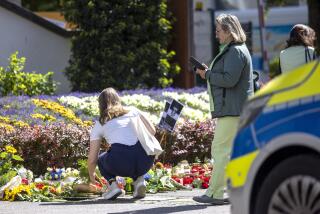Arab Defendant Cites Role of Syria in German Blast
- Share via
WEST BERLIN — Two Arab defendants charged with exploding a bomb at the German-Arab Friendship Society in West Berlin went on trial Monday, and the court heard testimony implicating Syria in the terrorist act.
One of the defendants, Farouk Salameh, 39, testified that he was following Syrian instructions when he bombed the civic group’s offices March 29, which resulted in injuries to nine people.
The other defendant, Ahmed Nawaf Mansour Hasi, 35, is the brother of Nezar Hindawi, the Jordanian convicted in a British court of the attempted bombing of an Israeli airliner in London on April 17. In Monday’s proceedings, the court heard pretrial statements in which Hasi admitted a role in the bombing of the friendship society and said he obtained the bomb through the Syrian Embassy in East Berlin.
The German-Arab Friendship Society was picked as the target, Salameh has said, after Hasi and Hindawi convinced him that the group was in league with Israeli intelligence.
“I questioned them on what evidence they had, and Hasi said it was 100%,” Salameh said. “So I agreed to the plan to blow the building sky high.”
Suspect in Disco Bombing
Hasi is also suspected, but not charged, in the bombing of the La Belle Discotheque in West Berlin on April 2, which killed two American soldiers and a Turkish woman and wounded more than 200 others. President Reagan accused Libya of responsibility for the disco attack, using that as justification for the U.S. air attack on Libya on April 15.
When questioned Monday, Hasi would not confirm all the details of his pretrial statement. His courtroom testimony was marked by emotional outbursts. At one point, he shouted, “I am not guilty!” He accused his prison guards of subjecting him to mental torture, saying “voices” were piped into his cell--a charge denied by West Berlin authorities. He also called out, “We are prepared to die” for the Palestinian cause.
Monday’s opening session was conducted under tight security, with the defendants behind bulletproof glass in the high-ceilinged courtroom.
Salameh, in his testimony, said he had flown to Damascus, the Syrian capital, early this year with Hasi’s brother, Hindawi. There, he said, he met a man called Abu Ahmed, whom prosecutors in the London trial of Hindawi identified as a Syrian intelligence agent.
Bomb in a Suitcase
According to Salameh, Abu Ahmed showed him a bomb in a suitcase and later arranged for it to be shipped through diplomatic channels to East Berlin, where he and Hasi picked it up a week before the attack on the friendship society. He did not say Monday precisely where he picked up the bomb, but both he and Hasi told investigators in their pretrial statements that the site was the Syrian Embassy.
The bomb failed to explode on the first two tries, Salameh said. When the bombing succeeded on the third try, the society’s office, on the building’s second floor, was empty, but nine people in a ground-floor bar were injured by the blast.
The Syrian ambassador to East Germany, Faisal Sammak, has denied that his embassy was involved in either that bombing or the attack on the disco.
After Hindawi’s conviction, Britain accused Syria of masterminding the attempted bombing of the Israeli airliner and broke diplomatic relations with Damascus. The United States and Western European countries, persuaded by Britain’s proof, imposed limited sanctions on Syria.
More to Read
Sign up for Essential California
The most important California stories and recommendations in your inbox every morning.
You may occasionally receive promotional content from the Los Angeles Times.













